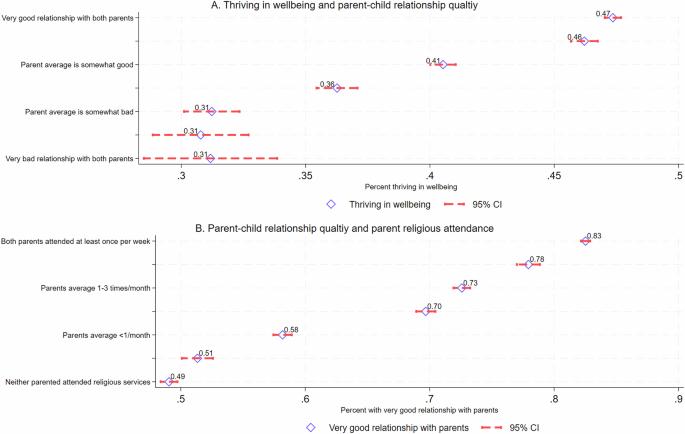Parent-child relationship quality predicts higher subjective well-being in adulthood across a diverse group of countries
引用次数: 0
Abstract
Theoretically and empirically, parenting is closely related to the psychological health of offspring, but long-term effects and possible international differences are not well established. In a pre-registered multilevel modeling analysis using data from the Global Flourishing Study, we tested whether retrospective parent-child relationship quality predicts adult well-being in a representative sample of 202,898 adults living in 21 countries and one territory. We developed and validated indexes of flourishing and mental health. Retrospective parent-child relationship quality predicted both with substantial effect sizes for flourishing (std mean effect = 0.21, 95% CI 0.19–0.23) and mental health (std mean effect = 0.18, 95% CI 0.17–0.20). A positive association between relationship quality and flourishing was found in all 22 areas (significant in 21). Parental religiosity positively predicted relationship quality (std mean effect = 0.09, 95% CI 0.06–0.11). In higher income and more secular countries, relationship quality was lower, but the well-being benefits were higher. Parental religiosity predicted higher relationship quality in every country in the sample. Cross-cultural evidence indicates an association between higher recalled parent-child relationship quality and adult flourishing as well as current mental health. Relationship quality was higher with reports of greater parental religiosity

不同国家的亲子关系质量可预测成年后更高的主观幸福感
从理论和经验上讲,养育子女与后代的心理健康密切相关,但长期影响和可能存在的国际差异尚未得到很好的证实。我们利用全球幸福研究(Global Flourishing Study)的数据进行了一项预先登记的多层次模型分析,测试了生活在 21 个国家和 1 个地区的 202,898 名成年人的代表性样本中,回顾性亲子关系质量是否能预测成年人的幸福感。我们开发并验证了幸福指数和心理健康指数。回顾性亲子关系质量对幸福感(std mean effect = 0.21, 95% CI 0.19-0.23)和心理健康(std mean effect = 0.18, 95% CI 0.17-0.20)都有显著的预测效果。在所有 22 个领域中,关系质量与蓬勃发展之间都存在正相关(在 21 个领域中显著)。父母的宗教信仰对人际关系质量有积极的预测作用(std 平均效应 = 0.09,95% CI 0.06-0.11)。在收入较高和世俗化程度较高的国家,关系质量较低,但幸福感较高。在样本中的每个国家,父母的宗教信仰都预示着较高的关系质量。跨文化证据表明,较高的亲子关系质量与成人的蓬勃发展以及当前的心理健康之间存在关联。父母宗教信仰越高,关系质量越高
本文章由计算机程序翻译,如有差异,请以英文原文为准。
求助全文
约1分钟内获得全文
求助全文

 求助内容:
求助内容: 应助结果提醒方式:
应助结果提醒方式:


